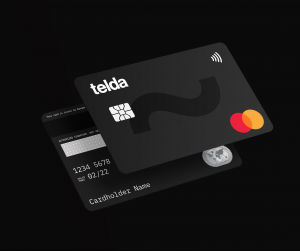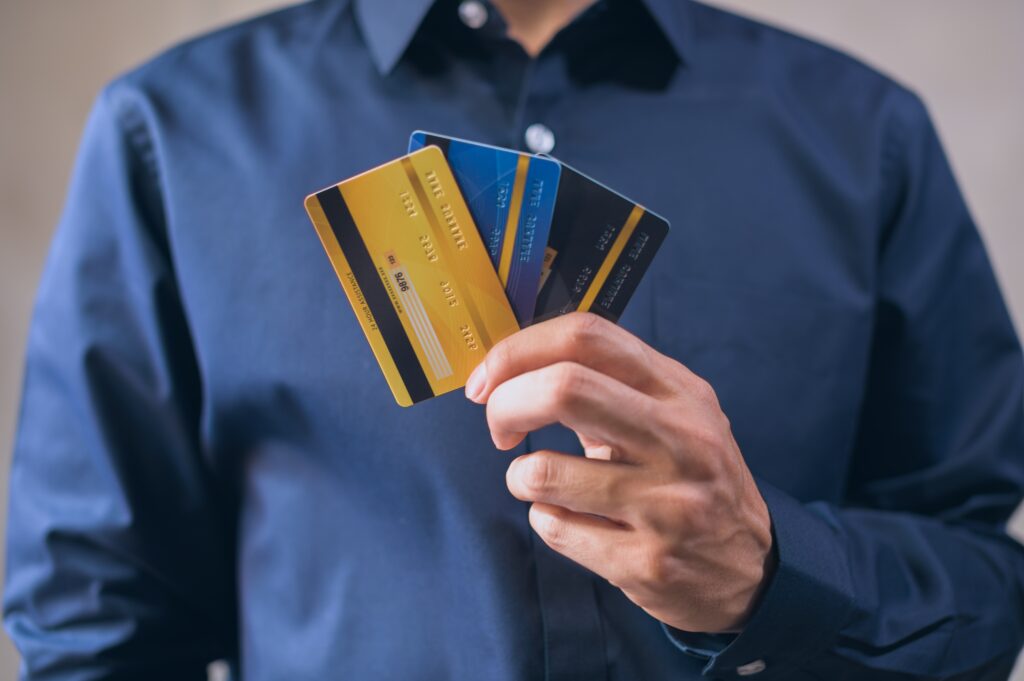*This piece has been updated on 18 July, 2022 with news of CBE’s approval.
For the first time ever, an Egyptian digital banking startup, Telda, received Monday The Central Bank of Egypt’s (CBE) approval to start operating its card and application in the Egyptian market, in a stride to fulfill financial inclusion and digital transformation goals as envisioned by CBE.
“We are very happy to have received the final license from the Central Bank of Egypt to launch the Telda app and card, as we strive to participate in the country’s transformation into a digital economy and help accomplish the Central Bank’s vision to achieve financial inclusion through constantly offering smart and fast payment solutions,” Ahmed Sabbah, CEO & Co- Founder of Telda said in a statement.
That will allow the company to issue payment cards and onboard its customers digitally. The Telda app offers an entirely digital onboarding experience where users can sign up with their phone numbers and national IDs without any paperwork to create an account and receive a physical debit card at their doorstep.
To deposit cash into the Telda account, users can use their existing debit or credit cards or deposit money at ATMs that support Telda or via Fawry, Aman and Masary outlets.
“We are bringing a better way to send, spend and save money to anyone who has ever sought an alternative to the traditional banking system,” Sabbah told Forbes Middle East last year. Sabbah helped establish the startup along with former Uber engineer Youssef Sholkamy and a few other team members who previously worked at companies like Facebook, Uber, Amazon and Noon.”
In 2021, Telda landed $5 million in a pre-seed funding round led by Silicon Valley-based VC firm Sequoia Capital, according to a statement. Global Founders Capital and Class 5 Global also participated in the investment round. That is the first investment for all those VCs in Egypt.

However, while the app is already available on the App Store and Play Store since the startup’s launch in May 2021, Telda has not yet issued cards to users who signed up. Telda plans to reach a million people in its first year of operation.
“Through Telda, sending money to family and friends is as easy as sending a WhatsApp message. By syncing their contact list, users will be able to send and request money instantly,” said the startup in a statement.
Money transfers will be limited to other Telda users. They cannot use it to transfer money to other bank accounts, though they can receive money from others in Egypt or from abroad via the international bank account number (IBAN) they get when downloading Telda.
Legalizing digital banks
Under the old banking law, e-payment providers and fintech companies were not regulated. Meanwhile, the CBE focused on regulating digital platforms operated by banks. The new banking law sets conditions and procedures for licensing payment system operators and providers. It establishes operating regulations and requires platforms to provide adequate security, according to Mahmoud Bassiouny, regional managing partner and head of finance and projects at Matouk Bassiouny law firm.
“Service providers can now have agents in Egypt, as it is unlikely that all e-payment service providers establish Egyptian legal entities. However, this does not limit the liability of the service provider for services rendered in Egypt,” Bassiounsy explains.
At press time, specialized banks are still proposing amendments to the regulatory framework under the Banking Act that would see the issuance of licenses for banks focused on SMEs and digital and payment banking. Broadly speaking, “specialized bank “refers to institutions that follow a “digital-first” approach by reducing brick-and-mortar branches, focusing on small and medium-sized businesses, or reaching out to the unbanked through such services as small savings accounts and remittances.
To date, the CBE has received five applications from banks wishing to launch a digital arm — including the National Bank of Egypt, Banque Misr, Emirates NBD, QNB Al Ahli and Bank ABC, sources told Masrawy. Media reports also suggested Baraka Bank and Suez Canal Bank were interested in digital banking.
Banks that apply for a license will need to submit a market study and risk assessment, after which the CBE would set reserve capital requirements, deposit limits and lending ceilings, according to business news outlet Enterprise. Already licensed commercial banks won’t automatically get a specialized license, meaning that only new banks and subsidiaries of existing ones can be legally defined as digital-first entities. Under the current 2003 Banking Act, all banks operating in Egypt are defined as commercial banks.
Telda launched its app by partnering with a local bank. The startup didn’t share the specifics of its agreement with the sponsor bank, but told MENAbytes it is 100% independent. “We share some details of our user base with our banking partner for compliance and that’s about it. They have neither any say nor any control in the experience we offer to our customers,” said Sabbah.
Mastercard partnered with Telda and will support the startup in issuing prepaid cards to customers and facilitating transactions. The Telda-branded cards can be used for online payments, in-store purchases, paying bills and cash withdrawals.
“This milestone further promotes the digital transformation of the Egyptian economy and allows us to offer consumers a secure, convenient and seamless experience for their payment transactions from the comfort of their homes,” said Mohamed Assem, Country Manager Egypt, Mastercard.
Winning Gen Z hearts
“If you look at the banking products available in the market today, there’s nothing that
addresses the younger generation. We want to change that with Telda by building the first Gen Z-focused digital banking experience app for the Middle East.” The difference between Telda and digital wallets is the experience, he added. “Wallets operated by banks and telecom apps don’t really appeal to young consumers … Digital natives are born expecting technology, a user-friendly experience and interface from every interaction they do on their phones.”
Sabbah wants to build an appealing experience by tapping into peer-to-peer uses, such as sending small amounts of money, sharing a birthday gift, travel expenses, or paying someone back for coffee. “These small money interactions bring out the social part and make the app much more enjoyable,” he says.
Sabbah also hopes to offer a better spending experience. Younger generations want to focus on saving money, he says, not by tapping into financial products but by managing and understanding where their money goes.
Two out of every three individuals are currently unbanked in Egypt, amounting to 70 million people. That is not dissimilar to other countries in the MENA region, where 40% of the population have access to a bank account.
Telda’s mobile app, available for iOS and Android, comes with money management features, making it easier to track and manage expenses. For example, the app automatically organizes expenditures by category and merchant and can block or activate online purchases and cash withdrawals.
Businesses could use the app to receive money from Telda users. “Eventually, we plan to offer a dedicated offering to help them receive payments,” added Sabbah.
Shaking the money tree
Though Telda is marketed to be Egypt’s first digital bank, it follows in the footsteps of large online, non-traditional “neo bank” or “challenger banks” that originated in the U.K. after the 2008 financial crisis. The biggest is Revolut, with a net value of $33 billion, according to Bloomberg. When Revolut reported financial figures for 2020, it noted that it made $361 million in revenue in the fiscal year, a 57% increase versus 2019 revenue of $229 million. Gross profit in the period was $170 million. However, it still reported a net loss of $277 million.
Revolut has more than 16 million customers and sees over 150 million transactions per month. The plan will be to offer a broader range of services and promotions both to grow that base and get its users putting more money and time into the app, according to TechCrunch. That will also include “exploring newer areas like insurance and a deeper dive into investing and trading, and likely a significant increase in credit services, which have been a big growth engine for other neo banks and financial tech companies.” Revolut will also be doing more to build out its user bases in the U.S. and India.
Some companies have struggled to make money, like Monzo, a Revolut competitor. The company is still losing millions of dollars more than five years after its launch, according to a CNBC report in 2020. The business model of Monzo is based on several streams of income, such as subscription fees for business accounts, interest paid overdraft or consumer loans, lending to other institutions or partnerships with energy providers.
Telda’s exact business model is still not announced, but the startup joined a competitive operating environment in Egypt, and an entrepreneurship hub in the Middle East. According to MoneyThor, “for neo banks: to become profitable, it needs to offer premium account features, marketplace banking, SME facilitation, credit portfolio and wealth management.”
Sabbah is confident the flow of investment will continue. “I believe the opportunity we’re tapping into is huge. It’s a green field. It can be a good opportunity for investors, even tier-one venture capitalists,” he told MENAbytes.
Sequoia Capital’s first venture into the Middle East and North Africa market through Telda is not the firm’s first investment in tech; it has previously backed household names like Apple, Google, Oracle, YouTube, Instagram and WhatsApp.
“The name of the ‘money app,’ the slogan publicly used to market Telda, shows what we aim to be. We’re looking to change the money experience,” Sabbah said. “If you can move money from someone’s pocket to another and you have the infrastructure to make that happen, the opportunity is endless. The sky’s the limit.”







